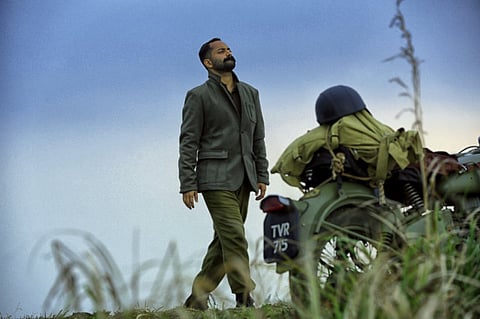Review: ‘Iyobinte Pusthakam’ is sheer poetry
This violent Malayalam period drama should not be missed

When an acclaimed cinematographer such as Amal Neerad directs a film you can expect a visual treat, and his 11th movie does not disappoint. Titled Iyobinte Pusthakam, the film opens with Punnoose, a communist who has written a book called Iyobinte Pusthakam. The movie is set in the 1970s when an emergency period was declared in India, and while Punnoose waits for the police to arrest him for his novel, he narrates this story.
Punnoose’s tale of Iyob and his three sons belongs to the pre-independence era of India. When we first meet Iyob, he is a young man working in Munnar’s tea estates, which are owned by Harrison, an Englishman. Harrison rescues Iyob from being thrashed by his supervisor and takes the worker under his wing. In time, Harrison’s wife, fed up with Indian life, returns to the UK. Harrison then takes Kazhali, a Toda tribal woman (considered a sorceress and feared by the natives), as his mistress. Kazhali’s good fortune ends with Harrison’s death.
Iyob soon assumes charge over Harrison’s house and estate, and throws out Kazhali, who is pregnant with Harrison’s baby. From a docile servant, he becomes an arrogant master who is feared and despised.
When Iyob’s wife Annamma, contracts malaria and dies, Iyob is left to bring up their three sons alone.
Dmitri and Ivan, the elder sons are chips off the old block, but the youngest, Aloshy (Fahadh Faasil), takes after Annamma and is soft-hearted. After witnessing his brothers kill a servant girl, a terrified Aloshy runs away from home and joins the British Navy.
The film picks up steam when Aloshy is forced to return home after being indicted in a naval mutiny against the British Queen. He is shocked to find that his father and two brothers have not changed at all.
From the start, each frame is sheer poetry, transporting viewers on an overwhelming journey back in time.
Co-writers Gopan Chidambaram and Syam Pushkaran grab viewers’ attention with their taut screenplay. The characters are solid and bust stereotypes.
Neerad’s unique presentation lies in its silent eloquence — a lot is conveyed with few spoken words. Supporting him is the flawless acting of the cast including a powerful performance from veteran actor Lal. And Faasil is brilliant as the quiet yet determined Aloshy.
Vinod Chemban, last seen in Sapthamashree Thaskaraha, transforms into the sadistic and impotent Dmitri. And Jinu Joseph as Ivan is commendable. Vinayakan as Chemban is another versatile actor. And watch out for Jayasurya, as a Tamilian businessman whose devious ways are camouflaged behind his omnipresent smile and the steely glint in his eyes.
Among the actresses, Padmapriya is outstanding. As Rahael, Dimitri’s wife, she plays a convincing seductress, who switches loyalties to suit herself. Lena as Kazhali brings to the fore a tribal woman who has been wronged. However, Isha Sharvani’s expressions don’t come through and there is an incongruent scene in this period tale: Amala Paul’s sudden dance number.
In this story of a man-eat-man world, there is a lot of gruesome violence. But, if you love good cinema don’t miss this movie.
Sign up for the Daily Briefing
Get the latest news and updates straight to your inbox


